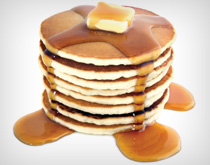
It's 7:30 on a Saturday morning. Most Carnegie Mellon students are probably sleeping. Not Elissa Goldner. The first-year student rolls out of bed and heads to the shower, thinking of her busy weekend ahead. She has basketball practice later today; Goldner is a forward on the team. The civil engineering major has lots of homework, too. And this morning the basketball team is hosting Hotcakes for Heroes, a $5 all-you-can-eat pancake charity breakfast.
Dressed and ready to go, Goldner leaves the Donner House dorm and meets the team in the University Center. Her coaches and teammates, like her, are wearing Heroes T-shirts; on the chest is an H patterned after the Superman logo. Quickly, everyone is busy doing something—setting up chairs, preparing a serving line, putting napkins and syrup on tables, laying out Heroes merchandise.
By 9, the electric griddles are hot, mixing bowls are filled with pancake batter, and a donation jar starts to fill from the first customers. Goldner is at home ladling batter on the griddle, making pancake after pancake. As morning moves along, her teammates restock the juice and coffee, mix more batter, and sell Heroes shirts. Customers continue to come in waves, and many ask, "Exactly what is the Heroes program?" Goldner and her teammates explain that Heroes aids families with terminally ill children, so funds from breakfast help with medical co-payments, tests, medicine, and other costs often unpaid by insurance.
The team encourages everyone to meet 5-year-old Dante Mazzocca, who is one of the recipients of the program. Throughout the day, breakfast-goers say hello to him, but he is unable to talk and relies on his mother to communicate. She explains that Dante was born with Wolf-Hirschhorn and Beckwith-Weidermann syndromes, among several other physical handicaps. In his short life, he has survived liver cancer, has endured multiple surgeries, and is always at risk of seizures. His 13-year-old sister also has significant health problems, which leaves the parents with the demanding task to take care of them, spending not only money but enormous amounts of time—on the phone, at the pharmacy, in doctors' offices.
As the 1 p.m. closing time rolls around, the crowd thins out. The basketball players begin to clean up; they'll have a few hours before this afternoon's practice. Goldner looks at the donation jar. It's nearly overflowing. The event made $900, and many people clearly gave more than $5. She's glad she got out of bed.
—Kevin Trobaugh



